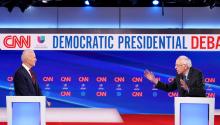Opinion

Despite the switch of rhetoric on the coronavirus in the past week from both President Trump and Fox News, some church leaders still refuse to close their doors. They tend to fall into a few different camps.

We’re the canaries in the mine, sensing the danger before it comes, and I hope for all of us that next time you’ll listen sooner. Maybe we can all learn the words of Philippians 2:4, to not only look to our own interested but also to the interests of others, or Jesus’s command to love our neighbor as ourselves.

A crisis like the coronavirus pandemic reveals who we are as individuals and society. When push comes to shove, as the saying goes, which side of us will have the final say?

Ruling authorities were concerned primarily about their image and standing with the public. The threat of the coronavirus was downplayed and ignored. They changed course and acted only after the evidence became undeniable. Even then a main concern has been to shift blame to others. Their obsession was with their reputation. Self-righteous defensiveness and pride governed power, rather than compassion and commitment to the common good. That is social sin.

In the midst of this coronavirus pandemic, I find myself waking up in the morning longing for something that will make me feel alive and tethered to hope. I scan my bookshelves for something that will remind me to keep going. I listen to music that helps me stay grounded and secured to goodness. We watch shows as a family and play board games so that we can laugh. We go on walks and chase the dogs in the back yard because we are trying to do this the best we can.

In some cities, mistrust was widespread. In others, people came together across religious lines.

Editor's Note: As part of her piece "Using the Love Commandment to Talk COVID-19 With Your Kids," Christian ethicist Kate Ott collected drawings and quotes from children engaging in the topic of loving your neighbor during this health crisis. Here's what they had to say.

Mexican American writers render their world — unrecognized and illegible — visible and legitimate.

Before a plague, God always sends prophets, often sick and impoverished themselves, to tell the powerful to reject wickedness.

As adults are forced into major social and work-related changes, we can quickly lose patience with our children, forget their perspective matters, and resort to “just do it”-type responses. I want to encourage parents to take a deep breath and invite children into a new way of being in the world shaped by COVID-19. Children are morally resilient and creative when we give them the chance. So, how can we talk with our children about this pandemic? Let’s use the love commandment as our guide.

The problem is not only with the corporations struggling to make choices when profits are on the line. As a culture infused with the values of life, liberty, and the pursuit of happiness, Americans value individualism and have a hard time understanding their role in community health measures. When we are taught to prioritize our individual rights and needs (see the discussions about guns, vaccines, and universal health care), it quickly leads to seeing other people as our enemy instead of a neighbor to protect. And that’s where religious communities must lead.

All of us are living into new daily rhythms. While that alone is disorienting, we are already moving from a life of daily inconvenience to one of fear. Institutions from sports to conferences to schools have transformed overnight. Many of our children — both schoo-age and young adults — are now home with us, which requires its own adjustments. And many, many people are finding themselves abruptly and unceremoniously out of work, with uncertain prospects for future paychecks as social distancing measures continue for an unknown length of time. Amid this, we must not let fear become a way of life. We remember the words of Jesus: Love can cast out fear. Leaning into love and learning what it really means to love our neighbors in this crisis will be crucial to our collective health and survival.

If you’re more tech savvy, socially networked, or otherwise resourced than your aging parents, you may be tempted to believe that you’re responsible for the way they will weather this season of COVID-19. Invite your loved ones into a conversation that honors all their experience and wisdom. At the same time, be mindful that even though they are your parents, they may need your help taking necessary precautions. Together you can discover and implement measures that support them during these uncertain days.

The federal government is big, and it intervenes. The question is, for whom?

We don’t have to guess at the damage that will be caused by financial barriers to care.

On March 7, our rector, Tim Cole, was diagnosed with COVID-19, the disease caused by the new coronavirus. Sleepless nights and frenzied days followed. The pace has been relentless. My concern for our community, especially its most vulnerable, my family, and my own health have left me tender and, at times, fearful. Yet, through it all, God remains close and grace abounds. While I am limited to phone calls and video chats, I have never felt closer to my people. We have whispered our fears, laughed at our misplaced anxieties, and committed ourselves to being church, even without our beloved building and cherished traditions.
Our new normal in a time of coronavirus: pastoring, loving our neighbor, preserving mental health, and more.

As I write this piece, my sons are not at school but home with me, because their elementary school decided to start Spring Break three days early to slow possible transmission of the virus and keep the community as safe as possible. While this has caused some inconvenience, I realize just how fortunate I am — I can work from home when needed and I have access to both sick leave and personal days. This is not the case for the majority of workers in the country. Congress will likely be voting soon on the Families First Coronavirus Response Act, which would provide urgently needed funding and provisions for free testing, three weeks of paid sick leave, unemployment insurance, supplemental food stamps, and nutritional support to kids who depend on school lunch. I’m hopeful and prayerful that the White House and Congress can transcend politics in this moment and pass this bill, because the virus knows no party and a bolder response is overdue.

